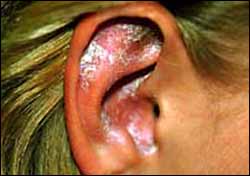
Autoimmune diseases are quite complex and this is due to the fact that these illnesses do not depend on just one gene. Thus, in order to find a suitable treatment, it is not enough to identify a gene involved in the development of the disease – each and every one has to be identified. To this end, a number of strategies have been design; for example, many geneticists have begun to analyse the genetic differences between healthy individuals and ill ones. A team at the Leioa campus of the University
Researchers seeking to direct cancer-killing immune cells against the deadliest brain tumors have three new targets that show promise in laboratory studies and in a Phase I patient trial, according to two articles in the July 15 issue of the journal Cancer Research.
The antigens, previously associated with several other types of cancer cells, were recently found to be expressed in the most common and aggressive type of malignant brain tumor, glioblastoma multiforme (GBM). Scientists at Ce
Living organisms are an enormous reservoir of natural compounds potentially active against viruses, bacteria or cancerous cells, that could lead to the development of new medicines. Out of about 145 000 natural substances described today, 10% come from marine organisms. Among the few such organisms studied for their chemical composition, sponges of the genus Phloeodictyon (Haploscleridae) collected in shallow New Caledonian waters during campaigns of the programme “Marine Substances of Biological I
UCSF researchers have found that some HIV patients treated with antiretroviral therapy early after infection do test negative, at some point, for the virus. Study findings showed this result in six of 87 patients.
“First, these patients are not cured. When these patients went off therapy, HIV virus levels rebounded. These results do show that with effective early treatment that reduces the virus to very low levels, the immune system may have less antibody response to HIV,” said the study&#
A natural mutation of a gene that helps regulate the reactivity of the immune system is a major contributor to type 1 diabetes, Medical College of Georgia researchers have found.
The newly discovered gene, SUMO-4, controls the activity of NFêB, a molecule that in turn controls the activity of cytokines, proteins that regulate the intensity and duration of the immune response, according to research that will be published in the August print issue of Nature Genetics and online July 11.

Very Large Telescope Unravels New Population of Very Old Massive Galaxies
Current theories of the formation of galaxies are based on the hierarchical merging of smaller entities into larger and larger structures, starting from about the size of a stellar globular cluster and ending with clusters of galaxies. According to this scenario, it is assumed that no massive galaxies existed in the young universe.
However, this view may now have to be revised. Using the multi-mode F